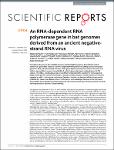An RNA-dependent RNA polymerase gene in bat genomes derived from an ancient negative-strand RNA virus
Horie, Masayuki
Kobayashi, Yuki
Honda, Tomoyuki
Fujino, Kan
Akasaka, Takumi
Kohl, Claudia
Wibbelt, Gudrun
Mühldorfer, Kristin
Kurth, Andreas
Müller, Marcel A.
Corman, Victor M.
Gillich, Nadine
Suzuki, Yoshiyuki
Schwemmle, Martin
Tomonaga, Keizo
Endogenous bornavirus-like L (EBLL) elements are inheritable sequences derived from ancient bornavirus L genes that encode a viral RNA-dependent RNA polymerase (RdRp) in many eukaryotic genomes. Here, we demonstrate that bats of the genus Eptesicus have preserved for more than 11.8 million years an EBLL element named eEBLL-1, which has an intact open reading frame of 1,718 codons. The eEBLL-1 coding sequence revealed that functional motifs essential for mononegaviral RdRp activity are well conserved in the EBLL-1 genes. Genetic analyses showed that natural selection operated on eEBLL-1 during the evolution of Eptesicus. Notably, we detected efficient transcription of eEBLL-1 in tissues from Eptesicus bats. To the best of our knowledge, this study is the first report showing that the eukaryotic genome has gained a riboviral polymerase gene from an ancient virus that has the potential to encode a functional RdRp.
No license information

